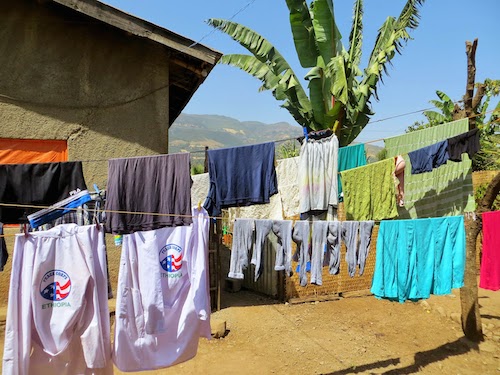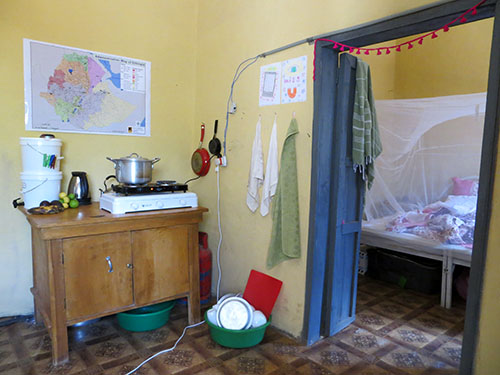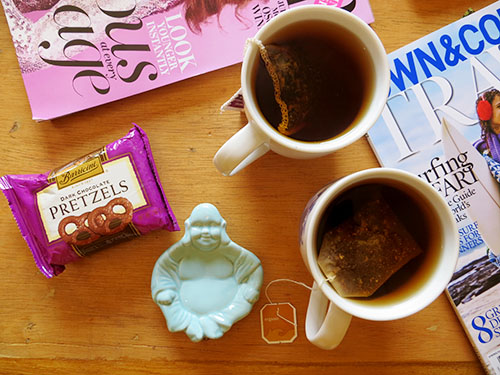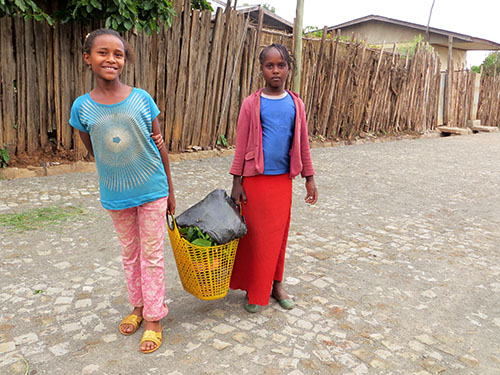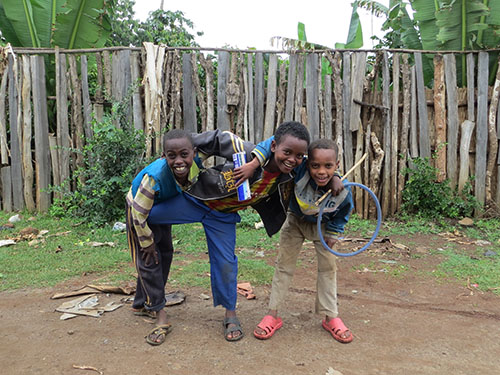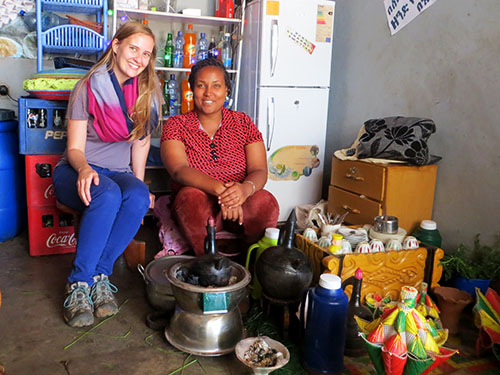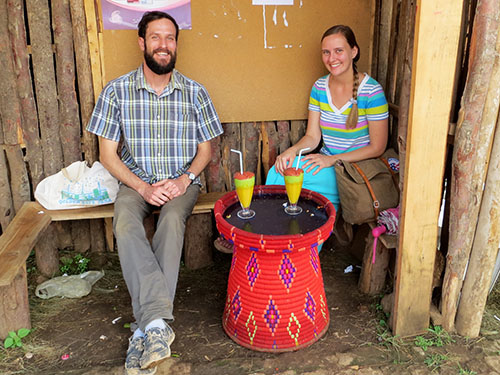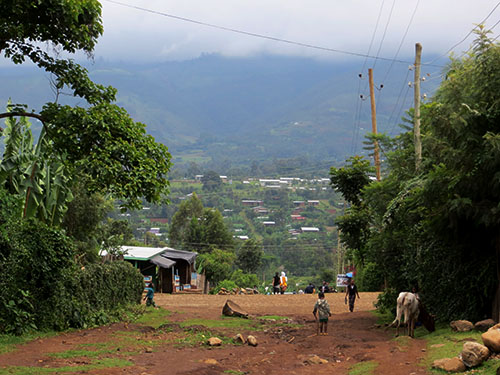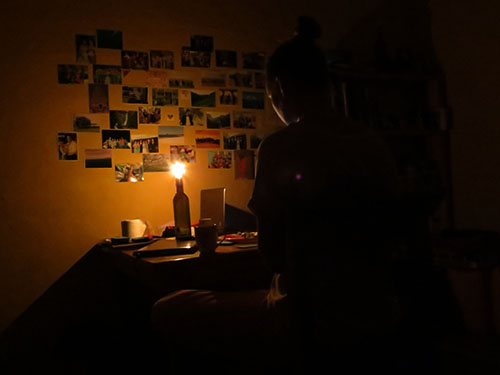By Gabrielle.
If I ever feel like my day is overflowing with challenges, I’m going to re-read Maggie’s account of her day. She’s a Peace Corps volunteer currently serving in Ethiopia, and her daily life is probably very different from yours or mine. For example, it might take her 15 minutes to properly and politely greet everyone on her way to work in adherence to local customs; there is no casual smile and wave allowed, even when sour moods are in the air! The internet is unreliable and slow. Also, her house has no indoor plumbing.
It all kind of makes me a little sheepish when I’m stressed about wrangling traffic or tackling a super long must-do list!
I’ve repeated one of Maggie’s thoughts to myself more than a few times since I interviewed her: “You can’t think about things you can’t have if you want to survive in the Peace Corps.” I guess that applies to all of us in some way or another, don’t you think? Please help me welcome Maggie! You’ll want to hear about her bedtime rituals; they’re quite lovely.
I wake up from the sound of wood smashing coffee beans. The maid is smashing coffee for our compound family using the traditional way: a large wooden mortar and pestle. Thud. Thud. Thud. Thud. Thud. The rhythm is steady and loud, just outside our bedroom. It’s only 6:30 am, so I try to snooze a bit more before our alarm starts singing.
I wake up and cover my nightie with a shidi, a simple, sack-like dress that goes from neck to floor. It’s leisure wear and every Ethiopian woman wears them around their compounds. I wear it because I have to go outside of my house to use the shint bet (outhouse/latrine) and even though my nightie is not scandalous by western standards, it is in Ethiopia. Our house has no indoor plumbing and we share the shint bet with our compound family. It’s a squat toilet, but I don’t mind it. After using a squat toilet for almost a year, I prefer it.
I teach class in the morning today, although every two weeks my classes shift to the afternoon, so I have a quick breakfast of green tea sent from America – the good stuff! – and white bread with peanut butter. I miss my old breakfasts of Greek yogurt with muesli, but I quickly push it from my mind. You can’t think about things you can’t have if you want to survive in the Peace Corps.
Twenty minutes before I have to start teaching my first class, I start my commute. My school is less than a ten-minute walk away, but I need extra time for greetings. Ethiopians value greetings very, very much. I greet six people on the way to school: two little girls playing outside their house, a trio of young boys walking to school, and the husband of one of my coworkers. The husband of my coworker is putting out the cow for the day. I shake his hand, ask how he is, how his family is, and how his work is. He asks me how I am, how my husband is, and if I am going to teach. We do this all in Amharic, the official language of Ethiopia, which most people in our town speak. However, when we say farewell, I use the local language, Kambatissa,,to tell him to have a nice day. “T’ooma hos!” I say. He smiles wide with laughter and says the same to me.
I speak only a tiny bit of Kambatissa because it is used only in our zone, and Peace Corps trained me in Amharic. I love using what Kambatissa I can though, because people LOVE it. They really freak out and then they feel like we are one of them and are so kind to us. Integration win!
As I approach the school, I start seeing students in their green uniforms. I casually say hello in English to the students I see. It’s time for teacher mode – time to speak and teach English – but first I need to get my white lab teacher coat that all teachers wear, chalk, and eraser.
I walk into the teacher’s lounge and say hello to each individual teacher. I shake each of their hands and ask, “Hello, how are you? I’m fine, thank you.” Sometimes, when everything is hard and I wish I could be anywhere but a rural, Ethiopian town, these greetings to every single teacher (there are often at least 20!) can be really taxing.
Once or twice, I’ve rushed in and out of the lounge and went to hide behind one of the buildings like a naughty student to wait the few minutes for class to start. I just could not do it. Life can be really overwhelming sometimes. Thankfully, today is not one of those days. I smile, I greet, I check the time, and go teach.
Punctuality is not a strong suit of Ethiopians in general, but I am very punctual. My students have learned this and they are mostly all in their classroom waiting for me to show up. In Ethiopia, the students stay in the same classroom all day and the teachers go from class to class. There are positives and negatives to this set-up, but I do wish I had my own classroom. As I walk in the classroom I say, “Good morning!” and the students all chorus back, “Good morning, teacher.”
Today we are learning about present perfect continuous. I write notes on the board and they dutifully copy them down in their notebooks. We go through the notes on the board together, students volunteering to read some parts when asked and me reading the rest. The same ten students raise their hands to volunteer when I ask who wants to help me read, but I don’t mind. I write some practice questions on the board, mostly fill in the blank, and have them work on them while I walk around. I hear a ruckus from one side of the room and go over to see a lizard has gotten in. We all laugh, I tell them the English word for what it is, and nudge it toward the door with my foot. After the lizard is out, I continue walking around the room and tell the students who are sitting and doing nothing, “Try! If you don’t try, you will never succeed.” I don’t know how many times I’ve said this over the school year.
When they are finished with the practice questions, they call me over to check their work. I was very happy to see one girl, who had never asked me to check her work before, raise her hand. That increase in confidence is something I’ve been working towards all year. Even though today it was just one girl, showing just one small increase in confidence, I can’t help but feel like that one hand raise is a win. In Peace Corps, you have to celebrate every win, no matter how small. Today I will celebrate that hand raise.
Class is over and I go to the shy bet – literally translated as tea house, but they serve coffee, tea, and sometimes bread or sambusas, fried dough with lentils inside – with a couple other teachers to drink coffee. It’s a small building (about 10’x12’) with mud walls painted blue and a tin roof. Mimi, the girl who works there, greets me with a smile and tells me in Amharic that she is boiling the coffee, which means it is almost ready. When it’s finished, she brings over a small cup and pours the rich, dark coffee out of the traditional coffee pot, called a jebena. She knows I like bado buna – empty coffee – so she doesn’t bring me the sugar bowl, like she would for most of the other teachers. Today my coworkers and I talk about climate change and who should pay for it. As a representative of the US, this could be tricky for me. However, the teachers I am with are open-minded, and I’ve learned to be diplomatic in situations like this. Also, these guys are my friends and we’ve talked about this before, so they know my basic standpoint.
I teach one more class and then go home. My official work is done for the day and it’s only 11:00 am! However, Peace Corps tells us we are on the job 24/7, 365 days a year, and it’s true. Interactions with locals in our town could be the only time for them to meet an American, and so their entire opinion of America could be based on how we act.
On the walk home, I stop at my new favorite shop to say hello to the nice woman who runs it and her gorgeous baby daughter, Diana. Today, Diana reaches for me, so I get to hold her while her mama gets me the things I need. These small shops are just a window you walk up to, so the shopkeeper collects everything you need and brings it to the window for you. Today I buy seven eggs, a kilo of potatoes, five candles, and a half kilo of dried chickpeas. I pay and give Diana back, silently grateful that she didn’t go potty on me since I realized she was not wearing a diaper.
At home I find Spencer, my husband, already back from teaching at the other high school in town and washing the dishes on the floor. He’s using our two, big green tubs to rinse the dishes and is listening to a Stephen Colbert audio book. I put a pot of water on the stove to boil for drinking water and start to help with the dishes.
When we finish the day’s chores, we decide to go to town for lunch and to use the internet. We go to a very basic restaurant to eat bayonet, which is a flat bread-like staple with little piles of different dishes on top. There are spaghetti with tomato sauce, lentil stew, rice, locally made cheese (covered with tomato sauce), and a potato/onion/cabbage mixture. In the dry season carrots and beets are included as well. The owner comes over to talk with us while we eat and we greet his little daughter in English to let her practice her skills. The restaurant is named after the daughter, which I think it so sweet. She is nine years old and is not shy to talk with us.
After lunch, we wash our hands (Ethiopians eat with their hands, and so do we!) and say farewell to the restaurant staff. We’re still a little hungry and so we go to get a juice. We live in southern Ethiopia, where we are lucky enough to get fruit year round. We always get espritz, which is a mix of different kinds of juice layered on top of each other. It’s super yummy! We know all the staff at this place too, so we greet them all when we get there and say farewell when we leave.
Next stop is coffee. We go to a shy bet we like, where the coffee is good, the people are friendly, and they boil their cups to kill germs in between uses. Not everywhere boils the cups and when they don’t the chances of us getting a bacterial infection, an amoeba, giardia, etc. is higher. We try to avoid sickness at all costs, because it really sucks to be sick when you don’t have indoor plumbing!
After coffee we head to the internet house to check Facebook, read email, and look up the things on our “list of things to look up on the internet” that we always seem to be making. The place we go to is just a small room with six computers, a copier, and a printer. It costs 12 birr per hour, which is about $0.60 an hour. It’s cheap, but slow. This is my first time to the internet in a week so I’m excited to see what’s been happening on Facebook.
After just 15 minutes of slow internet, and in the middle of writing a message to my sister-in-law, the power goes out. All the screens go black and Spencer and I look at each other like, “Great. Awesome. Well, that’s life in Africa.” We wait ten minutes to see if the power will come back on, but it doesn’t so we pay and go home. We’ll try the internet next time we’re in town.
Spencer and I walk home to the sound of thunder. It’s the beginning of the rainy season and in Durame, our town, when it rains it’s almost always accompanied by thunder and lightning. I really love it! We make it home just as it starts to rain. The power is out at our house too, so we open the shutters to let the light and the smell of the rain in. We don’t have window panes, but it’s not raining hard enough or at the right angle to make it in the house.
I start lesson planning for tomorrow’s lesson. I use topics from the official English for Ethiopia textbook, but supplement my lessons with information from a couple grammar books. I try to present the information very clearly, with relevant examples, and always get them to practice what they learn. It’s an easy topic, so it only takes me about 30 minutes to plan my whole lesson.
Before starting dinner, I make a cup of tea and read a magazine my mom sent me. The things I really miss from the western world are food and magazines, so I’m always grateful to get them in care packages! Today I read Elle and try to decipher what the new trends are in the US. I feel really behind on pop culture. I can only imagine what it will feel like to land back on American soil in the fall of 2016. I’ll probably feel like an alien and all my clothes will suck.
This thought makes me feel torn and sad. I want to be here, but I want to be there, too. I acknowledge the sadness, and then let it go. Staying balanced is a daily struggle, and I try to stay in the moment as much as I can.
Spencer puts on a new mix he made on the iPod and we make dinner to the sounds of the Alabama Shakes, Courtney Barnett (and other Triple J top 100 favorites), and Chimes of Freedom (a collection of Bob Dylan covers – Kesha’s version of Don’t Think Twice, It’s Alright is AH-mazing! Seriously, and I usually don’t like her stuff.) It’s getting dark, so we shut the shutters and turn on the lights.
Tonight we make a meatless taco bowl with red beans, rice, carrots, onions, garlic, tomatoes, and taco seasoning, topped with avocado and lime. In the middle of making it, the power goes out. We turn on flashlights, light candles, unplug the electric stove and set it on the floor (to make room for the gas stove), and move the pot to the gas stove. We take all this in stride, as it’s an almost daily occurrence. The power goes on and off randomly and frequently, especially during the rainy season.
When dinner is ready we turn off the music and turn on the laptop to watch an episode of Vice. We just got the latest season from another Peace Corps Volunteer we met up with in Hawassa, the capital of our region and just three hours away from Durame. Peace Corps volunteers almost always travel with their external hard drives to share media. It really helps when you don’t have the internet or TV at your house or access to an English library. Peace Corps can get a bit boring and lonely sometimes. Luckily, we’re stocked with new (to us) shows and movies. We watch the Vice episode over dinner and afterwards talk about how crazy it was and our views on the main points. For dessert, we eat a couple squares of dark chocolate, sent from the US. A big thanks to both our moms for sending chocolate!
After dinner, Spencer rinses the dishes using the (mostly) clean water we have in buckets. We have a tap in our compound that turns on once or twice a week and we fill up the buckets then. The dirty water goes into another bucket, which we dump into a hole outside in our compound. We have one hole for water waste and one hole for food waste.
We brush our teeth, spitting into the water-waste bucket. Then we wash our faces, each pouring the water for the other so we can splash water on our face with both hands. I realize that this pouring of water is really quite romantic and intimate. It’s a daily reminder that we are here in this crazy world together, helping each other and loving each other.
Before going to bed, we both need to pee but it’s raining and dark outside, so we use the chamber pot. (Yes, we have a chamber pot!! Everyone here does. Sometimes I feel like we are living in the Wild West.) I go first because it’s easier for Spencer to not splash. We wash our hands and crawl into our mosquito net covered bed. We play a couple games on the smart phone or iPod (I play Criminal Case and Candy Crush, and Spencer plays Tiny Wings), then blow out the candle and settle down for sleep, all with the sound of the rain hitting the tin roof.
The rain starts to fade and then stops. A couple minutes later, I hear the hyenas start to whoop. I snuggle up close to Spencer to get more warmth and give him a good night kiss. The last thing I think about before going to sleep is that this is a crazy hard, fun, and interesting life and I am so glad Spencer is here to share it with me.
–-
Maggie, the way you describe pouring each other’s water so you can each wash your face properly and a little more easily, truly made me catch my breath. You are right: it is a daily reminder that we are in this crazy world together, helping each other and loving each other. Also, I have to tell you how much I loved seeing the photos on this post. Ethiopia is the only African country I’ve been to, and this post has me reliving my favorite memories from that trip. Thank you so much.
Have you ever thought about what it is you do on a daily basis for someone else that sends the same message? I’d sure enjoy hearing about your tiny acts of kindness and love! And I can’t help but giggle when I think of how Maggie will probably be able to see this post…in a week or two! Tell me if you can go without the internet for that long!
P.S. – You can see all my Call It A Day posts right here. Are you interested in sharing your unique day with us? Let me know! It’s a lot of fun…I promise!
